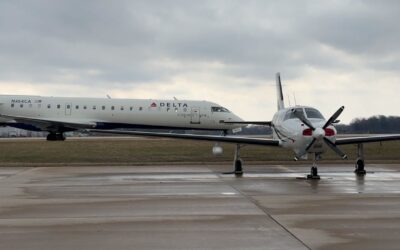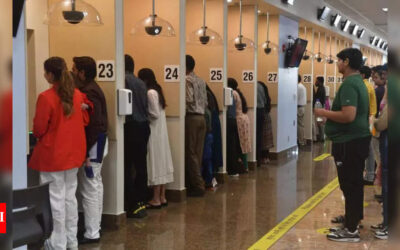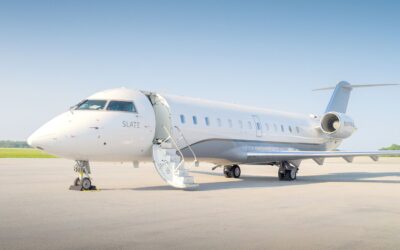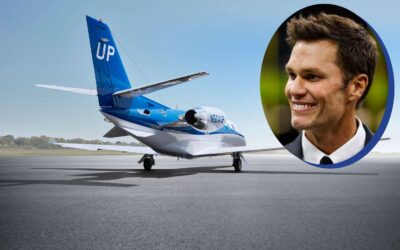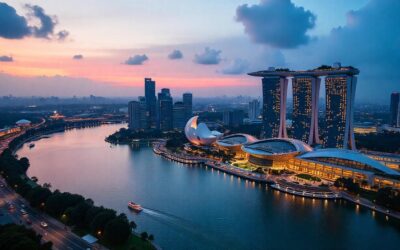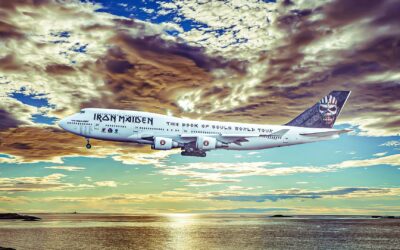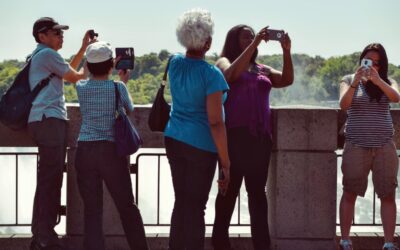Four or five times a year, Stephen Prince, a businessman who lives in St. Simons Island, Georgia, has taken friends, customers and colleagues on a hunting trip to a Faisan reserve in the northwest of Nebraska. A commercial flight on that route would be arduous: if everything went perfectly, it would probably spend at least nine hours traveling in one or two connections, more than one hour by car from the nearest commercial airport and more time going through safety, approach and approach the others Ritual indignities of commercial air trips.
But Prince, who founded a business in the 1990s that has made a fortune impression of gift cards, is a rich man. He bought his first private plane a few years ago; Your current plane, a Cessna 650 appointment, can make the trip in approximately three hours (with a possible stop on the way to repost) from a small airport a few minutes from your home. Prince says that Flying Private is a magical experience: he can lead to the side of his plane and climb on board. The crew members will carry their hunting bags and equipment and park their car. If you are flying in the afternoon, it will be received with a glass of whiskey; In the morning, you will get coffee and a newspaper.
“If that does not spoil you, you are not Mim a,” he told me. “You don’t need a complete spoonful of private planes to discover how it knows, it’s quite surprising.”
However, no matter how much he loves, Prince has decided to kick his high flight habit. A progressive activist, is the Vice President of Patriotics Millionaires, an organization of rich people who favor the highest taxes to rich people like them, Prince argues that flying in private is too expensive and unfair. Not for him, but for the rest of us, and for the planet. His group is not asking other private flyers to melt their planes, but argues that if rich people will continue with luxury, at least they should be taxed by privilege.
According to an analysis published this month by Patriotic Millionaires and the Institute of Policy Studies (IPS), a group of left -wing experts, private aircraft users are not close to their part of the cost of maintaining US airports and an airspace.
Each commercial airline passenger in the United States is subject to a 7.5 percent tax on national ticket prices, an installation charge of up to $ 4.50 per flight segment (up to a maximum of $ 18 for a first leg and return) and additional charges for flights to Alaska, Hawaii or international trips. Private flyers only pay taxes on fuel surcharge of approximately 22 cents per gallon, according to the analysis. As a result, although they represent about 16 percent of all flights managed by FAA, private aircraft flights “contribute only to 2 percent of taxes that constitute the fiduciary fund that mainly finances FAA”
According to the analysis, “the average net worth of a complete and fractional private Jet owner is $ 190 million and $ 140 million respectively.” In other words, some of the richest people in the world are effectively subsidized by plebes like you and I flying coach.
Then there is climate change. Because they normally carry so few passengers on each trip, flying in private is much worse for the environment than to fly commercial. According to a transport & Environment report, a European group that advocates the transport of zero emissions, “private airplanes are on average 10 times more carbon intensive than commercial flights.”
When I talked to Ed Bolen, executive director of the National Business Aviation Association, a commercial group that represents the private air travel industry, challenged several of the IPS claims. Private airplanes can fly to thousands of airports throughout the country that are not served by commercial flights, said Bolen, allowing companies to operate in a broader geography than otherwise it would be possible. He also argued that air travel infrastructure is largely designed to meet the needs of large commercial planes, so it made sense that commercial airplanes have a much of the cost of maintaining the system. And he said that his industry is committed to improving its environmental impact; NBAA has pledged to achieve net zero carbon emissions by 2050.
Prince is not convinced. Flying Private is “probably one of the most greedy and selfish things I’ve done in my life,” he told me. “I just can’t keep doing it.”
Many other private flyers seem not to have such concerns. Private trips to Jet reached record levels last year, and many manufacturers and operators have reported a growing demand.
Part of this increase could be due to favorable tax laws for private property. Donald Trump’s tax reduction in 2017 allowed companies . And as Propublic recently reported, it is quite easy for rich people to use their business airplanes for leisure; The law allows them to maintain their deduction whenever they use the plane mainly for business trips, an indefensible raffle.
Perhaps the worst of private jets is the displacement they encourage. As I have written before, ordinary commercial air trips are often extremely waste; Flying is one of the most intensive forms in carbon and less efficient in the environment, and we rarely consider its costs as we go around the world.
Inefficiency means that relatively few travelers are responsible for a disproportionate part of pollution. A study published in 2020 found that “the most frequent frills’s percentile, at most 1 percent of the world’s population, probably represents more than half of the total emissions of passenger air trips.”
Private airplanes turbochargers The problem: make flying so easy for the Superrich that some people pass inexcusable amounts of time in the air.
Last year, the marketing company patio used @cebejet data, a Twitter account that tracked the private flights of celebrities (and since then it has been suspended by Twitter), to calculate how long some luminaires passed through Its aircraft. The upper Yard celebrity was Taylor Swift, whose plane passed almost 23,000 minutes, approximately 16 days, in the air in the first half of last year, throwing more than 1,000 times more carbon in the atmosphere than the average person in a year. (The Swift representative played the numbers, explaining that the plane often lends itself to others).
The @cebjet data have revealed another Cringey phenomenon: the very short jet trip of private jet, a contamination flexion that is the height of irresponsibility. Last year, Floyd Mayweather took a 10 -minute flight between Henderson, NV and Las Vegas, a trip of approximately 15 miles that would have taken about 20 minutes by car. Kylie Jenner took a 17 -minute flight between two suburbs in southern California, a trip that would have taken less than an hour. I can only think of this type of reckless extravagance: shameful.
The Policy Studies Institute suggests several sensible ideas that could slightly stop that excess. The group proposes a surcharge on flights of more than 210 miles, near the distance between Kennedy airport and Reagan National Airport. IPS also recommends a private aircraft sales tax, 10 percent in purchases of used aircraft, 5 percent in new ones, and a duplication of fuel tax for private airplanes. The group estimates that Elon Musk, whose plane made 171 trips in 2022, according to Bloomberg, would have paid around $ 4 million more in taxes under its proposals.
For Musk, that would not break the bank, and it is difficult to imagine that IPS proposals stop the private boom. But asking for private flyers that collect a little more about their aviation tab would be a good first step towards a more equitable transport system.
Chuck Collins, one of the authors of the IPS-Patiotic Millionaires report, pointed out a final problem with private planes: they allow the richest people to ignore the problems that the rest of us have to endure.
“When the ultra rich can choose not to participate in a system, they have much less participation in improving it,” Collins said. The debacle in Southwest Airlines said during the holidays. “If more than 100 billionaires could not get home with their families because the air traffic system was having a collapse, perhaps we would have a better system.”
Office schedule with Farhad Manjoo
Farhad wants Chat with readers on the phone. If you are interested in talking to a New York Times columnist about anything in mind, complete this form. Farhad will select some readers to call.
(Tagstotranslate) Private airplanes


